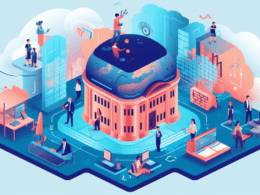In a world where “company culture” often translates to empty promises of free pizza and yoga classes, it’s tempting to dismiss it as fluff rather than a cornerstone of business success. But culture is far more than superficial perks—it’s the bedrock of your organisation’s future growth.
Companies that prioritise building culture consciously rather than defaulting to trendy perks gain a significant competitive edge. Indeed, a recent McKinsey study found that organisations with high cultural alignment have 4 times higher profits than those with low alignment.
The same study also revealed that companies with more diverse teams are 21% more likely to outperform their less diverse counterparts in terms of profitability. This finding underscores the importance of cultivating company cultures where high-performers can thrive regardless of their background, and where social mobility is actively promoted as a strategic priority rather than a HR box-ticking exercise.
Yet, discussions around social mobility are often missing from conversations about company culture. This is particularly true in the tech industry, where, despite significant investment in benefits, only 19% of the workforce hails from working-class backgrounds, compared to 33% of the wider workforce. This oversight overlooks the transformative potential of socially mobile talent to enhance business performance.
I founded Zero Gravity, a tech platform that empowers top socially mobile talent across the UK to access leading universities and careers because I recognised the untapped potential of individuals from low-opportunity backgrounds. Our platform has become a crucial solution for employers and universities seeking to recruit the best talent, regardless of their origins.
Building a culture that fosters social mobility is a no-brainer. But how do you achieve it? Here are my five key tactics for creating a workplace that embraces and powers socially mobile talent.
Start looking beyond the CV
Building a socially diverse team starts with looking beyond traditional CV experience. After all, talent is spread evenly, it’s just that opportunities are not. Studies show that contextualised academic performance is a far better predictor of long-term success than grades alone. For instance, a student who earns B’s at an underperforming state school, juggling homework with the uncertainty of their next meal, often possesses more raw talent than a straight-A student from an elite public school who has had access to private tutors.
Companies that actively seek out talent from lower socio-economic backgrounds and hire based on values and potential, rather than solely on prior experience, will outperform those that rely on tokenistic measures like equality statements and implicit bias training. Currently, only 5% of companies actively recruit early-career talent from lower-income households. Those that do will gain a competitive edge by tapping into talent pools often overlooked by competitors.
At Zero Gravity, we’ve experienced this firsthand by hiring from our own platform. Recently, one of our talented student members, who started as a tech engineer intern, joined us full-time. She’s now building the very platform that helped her succeed, using her firsthand insight to create a product that resonates with our members. The Zero Gravity platform used data to spot her talent where others might have missed it, using a carefully designed algorithm to contextualise her potential based on area and school performance.
Measure what matters
To truly build a culture that champions social mobility, it’s essential to measure your progress and results. While gender and ethnicity are more commonly tracked, it’s crucial to include social background as a key metric. This means assessing the socio-economic diversity of your hires and understanding the backgrounds of your workforce.
Beyond recruitment, if your company is large enough, measure progression rates for promotions and retention rates for your socially mobile employees versus the rest of your workforce. This helps identify whether these employees are thriving and advancing at the same rate as their peers. It can also highlight areas where additional support or resources might be needed.
Moreover, consider implementing anonymous surveys to gather honest insights from employees about their experiences and any barriers they face. Analyse this data to identify trends and make informed decisions about policy changes and initiatives to support social mobility.
By consistently measuring and analysing these metrics, you create a culture of accountability and transparency. This demonstrates a genuine commitment to fostering an inclusive environment where everyone, regardless of their background, has the opportunity to succeed and progress.
Keep it simple
Stand for something and be definitive about it. At Zero Gravity, our mission has been crystal clear from the start: Talent is spread evenly, but opportunity is not—and we aim to change that. Make your company values straightforward to understand. Establish a clear framework for what high performance looks like across the broader organisation and in each specific job role, leaving little room for ambiguity.
Your values should champion behaviours that distinguish your brand and set a clear agenda for your company culture. Avoid generic concepts like “collaboration,” “integrity,” or “compassion.” Instead, choose values that genuinely define your company’s unique identity. To have substance, they need to be things which some people don’t value or actively disagree with.
A compelling mission makes it easier to attract exceptional talent. It helps employees understand the significance of their work and embark on a journey that extends beyond the present, anchored in a clear purpose. By keeping your mission and values simple and well-defined, you create a strong, attractive company culture that draws in and retains the best people.
Tackle invisible barriers
Supporting your staff, particularly those in early careers, involves recognising the costs associated with entering and staying in the workforce. Many employees do not have the luxury of financial support from family or savings to rely on.
At Zero Gravity, we address this by paying our interns the London Living Wage and providing free accommodation for the duration of the programme. This ensures that no one in the UK is excluded from applying due to a lack of affordable housing options in London.
The legal sector is particularly notorious for expecting trainees to live in London on minimal grants, creating significant barriers for those from socially mobile backgrounds. Consequently, the proportion of lawyers from lower socio-economic backgrounds has declined to just 18% in recent years.
Supporting talent financially is crucial for building a diverse and skilled team. By removing financial barriers, you can attract the best talent regardless of their background. And this isn’t just about being considerate – it’s good business too. Zero Gravity’s internship scheme has become a key hiring channel for us, and the results driven by those we’ve hired have far outstripped our investment in internship accommodation.
Keep social mobility on the agenda
Elevate the conversation about social mobility and integrate it into your workplace culture to address the pervasive issue of imposter syndrome. Encourage open discussions about employees’ diverse backgrounds to break away from the middle-class echo chamber and create a sense of belonging.
Creating a culture where socially mobile employees feel supported enables them to excel and become mentors for others in similar situations. This establishes a virtuous circle: as these employees succeed, they inspire and assist others, perpetuating a cycle of social mobility within the organisation.
Addressing imposter syndrome directly by celebrating diverse backgrounds helps alleviate feelings of not belonging. Don’t underestimate the effect that constant office chatter about skiing holidays and fancy educations can have on someone from a background who has never enjoyed those luxuries. This, in turn, enhances employee confidence and performance, contributing to a positive feedback loop that strengthens the entire workforce.
Zero Gravity was recently crowned the Super Connect for Good 2023 Global Winner powered by Empact Ventures and Hays.










